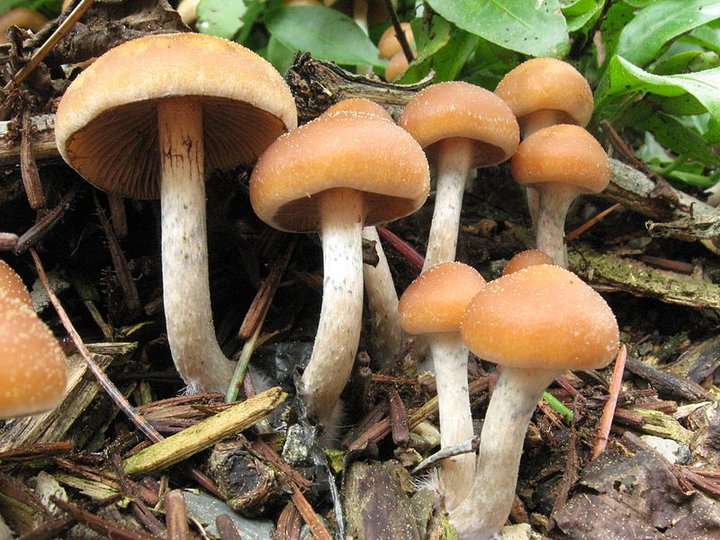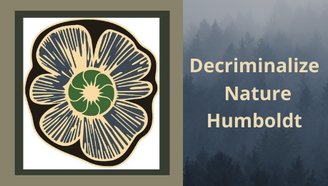
Psilocybe cyanofriscosa, a type of magic mushroom. | Photo: Alan Rockefeller, via Wikimedia Commons. Creative Commons license.
###
Arcata residents 21 and older may soon be free to embark on psychedelic trips without trip-to-the-police-department fears thanks to a new nonprofit named Decriminalize Nature Humboldt.
Stemming from a nationwide education campaign called Decriminalize Nature, the two-month-old local advocacy group hopes to push Arcata toward decriminalizing entheogenic plants and fungi. This would include the psychedelic drugs ibogaine (iboga shrub roots), dimethyltryptamine (ayahuasca), mescaline (cactus), psilocybin and psilocyn (magic mushrooms). The group posits that people seeking the medicinal benefits of entheogens should not be punished and that criminalization for using, possessing or sharing these drugs isn’t productive anyway.
Decriminalize Nature Humboldt caught the attention of Arcata City Council Member Sarah Schaefer, who has agreed to introduce a resolution that would decriminalize entheogens within City limits.

Decriminalization is not legalization. If adopted, a resolution would simply establish that the investigation or arrest for cultivating, using or possessing entheogenic plants and fungi would become the lowest priority for the Arcata Police Department. Under current California law, the cultivation and possession of these substances is considered a misdemeanor and offenders can be subject to a fine and/or a jail sentence of up to one year.
(The sale of entheogenic plants and fungi is a felony deemed worthy of prison time. The decriminalization of selling entheogenic plants and fungi is not included in the scope of goals pursued by Decriminalize Nature Humboldt or their parent movement.)
Schaefer — who during her campaign was approached by Arcatans interested in the decriminalization of psilocybin — told the Outpost that a resolution would largely be about “recognizing that this isn’t something that should be demonized.”
There are a lot of arguments for decriminalization. What seems to be the main argument in Arcata is the medicinal uses entheogens may provide for some people struggling with mental illnesses. People who want to use entheogens medicinally shouldn’t have to worry about the law, Shaefer said. “It’s not just people that want to party.”
For instance, administered through guided therapy trials, psilocybin and ayahuasca have been found to help improve moods long-term in patients struggling with severe depression. Other studies show that ibogaine helps kick opioid addiction.
“I feel very dedicated to educating people on the medicinal qualities of these medicines … helping people get the help they need to be happy,” Danielle Daniel, lead organizer of Decriminalize Nature Humboldt, told the Outpost.
Daniel, who recently graduated from HSU with a master’s in sociology, did a senior thesis on 18 people who have taken psilocybin mushrooms long-term. “One of the main things that I found in the research was that even when people would take mushrooms for [recreational purposes] over medicinal, it made people better humans,” Daniel said. “People would stop lying, or they would stop littering, or they would just be more connected to nature, which is awesome. And that is what we need right now — more connection with nature.”
Picking up long-lasting and positive habits — like increased care for nature or a decrease in criminal behavior — after using entheogens has also been suggested by a few studies.
Another argument for decriminalizing entheogens is that the status quo of criminalizing drug users in general is counterproductive, expensive and inequitable.
“Decriminalization of plant and fungi medicines in Arcata is the first step to right the wrong of the failed drug war. Nixon’s war was based on disrupting and arresting members in the civil rights group and anti-war group, not to protect people from substances and those who take them. The decision was based on politics, not science,” Daniel said in a Decriminalize Nature Humboldt press release, which also noted that with a resolution, funds currently used for entheogen-related arrests could be redirected to other areas.
Meanwhile — with medicinal uses in mind — California lawmakers are also looking to smush the war on drugs with Senate Bill 519, which would decriminalize entheogenic plants and fungi as well as other hallucinogens, like LSD and ecstasy, across the state. Oregon is the only state that has decriminalized psychedelics (actually, all drugs, in small quantities), and has legalized entheogens for medical purposes.
California State Senator Scott Wiener, SB 519’s author, argues that the war on drugs has criminalized addiction and has helped create a system of racist mass incarceration. “We’ve been trying to arrest our way and incarcerate our way out of drug use for more than 50 years. It’s been a complete failure. It doesn’t work,” Wiener said in an interview with ABC10.
SB 519 was approved by the California State Senate last month and is now moving its way through the Assembly. Shaefer noted that in addition to immediate local benefits of decriminalization in Arcata, passing the resolution would indicate support for SB 519 as the Assembly moves toward that decision.
Shaefer also mentioned that decriminalizing locally could potentially open doors for researching entheogenic plants and fungi at Humboldt State University.
Oakland became the first city in California to decriminalize entheogens in 2019, and Santa Cruz followed soon after. If the resolution passes in Arcata, Decriminalize Nature Humboldt will look into whether other Humbodlt cities are interested in decriminalization, too.
“It really has to do with the community,” Daniel said. “If I get involved in the community in Eureka and people are receptive, I would love to do that.”
Why might a city not be interested? The main concerns people have about decriminalizing entheogenic plants are addiction risk and underage use, but both of those worries are kind of moot, Daniel said. Though healing, the experience is also exhausting, so most people don’t want to use entheogens every day, Daniel said, plus, most people develop a quick tolerance. On top of that, studies indicate that entheogens are a useful treatment for kicking addictions, not developing them.
And in regard to the underage concern, this resolution would apply only to people over 21.
Some concerns about SB 519 include safety issues, like people accidentally picking and consuming poisonous mushrooms or driving during a trip. State and local decriminalization efforts are aimed to increase access for people seeking the medical benefits of entheogens, but would also allow recreational use, which some legislatures argue is unnecessary. One opponent of SB 519 is the Peace Officers’ Research Association of California, which fears decriminalization in California would increase drug dealing and crime.
Decriminalize Nature Humboldt will be tabling at every Arcata Farmers Market in July, where they will distribute information about entheogens, how to use them medicinally and what decriminalization rather than legalization means. The group has a petition that has so far collected 25 signatures.
CLICK TO MANAGE